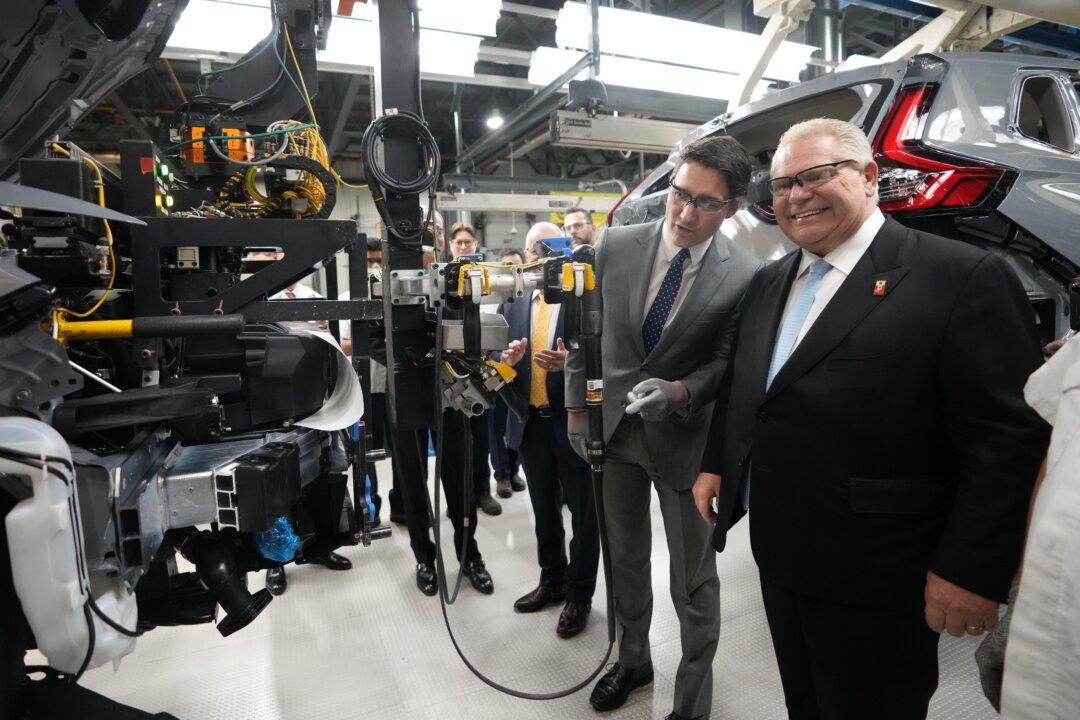Commentary
Q: Who said “A mere recital of the economic policies of governments all over the world is calculated to cause any serious student of economics to throw up his hands in despair”? A: Just about anyone who ever looked at them, including the Canadian and Ontario first ministers emptying the treasury into the pockets of multinational corporations. For instance, the $2.5 billion Justin Trudeau and Doug Ford
each just shovelled into Honda as if it were chump change.
That precise quotation is from Henry Hazlitt’s 1946 “
Economics in One Lesson,” the classic no MP knows. (Correct me if I’m wrong … please.) As I first read in graduate school, not for a course of course: “What possible point can there be … in discussing refinements and advances in economic theory, when popular thought and the actual policies of governments, certainly in everything connected with international relations, have not yet caught up with Adam Smith?”
One even wonders what possible point there can be in repeating the basics. But we must try because Trudeau just
chortled, “We bet big on electric vehicles. Now that industry is betting on us.”
Yeah, to keep handing out massive subsidies for products they can’t make money selling to consumers. The Parliamentary Budget Officer recently
estimated that prior EV-battery subsidies would cost $43.6 billion over a decade, $5.8 billion more than the politicians claimed. And now another $5 billion goes into this bonfire of the banknotes.
This latest subsidy actually is chump change, to them. The Fraser Institute’s Jake Fuss and Tegan Hill
calculate that the feds “spent $84.6 billion (adjusted for inflation) on business subsidies from 2007 to 2019” and “provincial and local governments spent another $302.9 billion on business subsidies for their favoured firms and industries.” And we’re the chumps.
It also is international economics, ostensibly. At the usual
artfully tedious photo op, Trudeau babbled, “the central part of my pitch, the biggest advantage that Canada has in drawing investments from all around the world, are Canadian workers who are the best in the world.” Productivity crisis? What productivity crisis? But then why all the free money? Honda has annual revenue around $125 billion, so if a Canadian factory were justified on its merits, they could find the cash.
Pseudoconservative Doug Ford called it “another example of our two governments together to rebuild our economy to create better jobs with bigger paycheques.” That economic activity exists to increase work not wealth is another stale chestnut Hazlitt roasted. But this announcement is about grateful workers increasing Santa Doug’s vote total, a bargain at just $5 million per job … for him. As for better cars, pfui. They’ll make us buy EVs whether we like them or not and, if even that plan fails, they’ll still roll in a pile of pension cash while we hold the empty bag.
Another piece of familiar idiocy here is Keynes’ “
multiplier” effect whereby a firm spends a subsidy dollar to pay a worker, then the worker to buy coffee, then the coffee shop to get more coffee, then the delivery guy to buy a car, and around and around and around it goes until we all get fabulously rich from one government dollar. Except of course a dollar taxed or borrowed away from private hands isn’t then paid to a worker who doesn’t then buy coffee, etc., and the whole chain is broken by my “
divider” effect.
Or worse, because public dollars are spent less efficiently. Commentators like Hazlitt don’t claim entrepreneurs are smarter, wiser, or more empathetic than politicians. Both often get things wrong. The big difference is what happens next.
If some beverage, say “New Koce,” doesn’t sell despite slick or stubborn advertising, companies must respond to real-time feedback from falling sales and profits by swallowing their pride, or their firm goes bankrupt and it stops mattering what they think. But if Trudeau’s massive EV investments flame out, will he be one penny worse off?
Heck no. The latest facilities aren’t scheduled for completion until 2028 but the photo op is already in the bank. And if it doesn’t get him re-elected, his “big bet” still only lost our money, not his.
You should also read Leonard Read’s “I Pencil” on why entrepreneurs need far less knowledge than central planners because the price system compresses vast quantities of information down to a “Yes” or “No.” But I recommend it to politicians in vain, because they ignore economic theory and abundant practical experience of one failed “industrial strategy” after
another for a reason.
Both those governments, and dozens of others, flirt with insolvency while throwing other people’s money around as if it were confetti because to them it is, whereas other people’s votes are cash on the barrelhead. Provided we don’t see through their exploded justifications.
Hazlitt did. What’s stopping us?
Views expressed in this article are opinions of the author and do not necessarily reflect the views of The Epoch Times.






